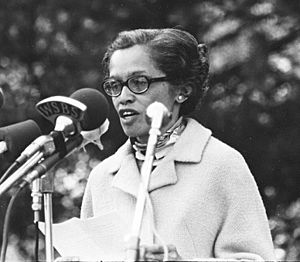Esther Cooper Jackson facts for kids
Quick facts for kids
Esther Cooper Jackson
|
|
|---|---|

Jackson in 1968
|
|
| Born |
Esther Victoria Cooper
August 21, 1917 Arlington, Virginia, U.S.
|
| Died | August 23, 2022 (aged 105) Boston, Massachusetts, U.S.
|
| Alma mater | |
| Occupation | Civil rights activist, social worker |
| Known for | Freedomways |
| Spouse(s) |
James E. Jackson
(m. 1941; died 2007) |
| Children | 2 |
Esther Victoria Cooper Jackson (born August 21, 1917 – died August 23, 2022) was an American civil rights activist and social worker. She worked with many important leaders like Shirley Graham Du Bois and W. E. B. Du Bois. Esther was one of the people who started the magazine Freedomways. This magazine was a special journal about ideas, politics, and writing. It was published from 1961 to 1985. She also worked as a leader for the Southern Negro Youth Congress.
Contents
Early Life and Education
Esther Cooper Jackson was born on August 21, 1917, in Arlington, Virginia. Her parents were George Posea Cooper and Esther Georgia Irving Cooper. Her mother was the president of the local NAACP branch. The NAACP is a group that works for equal rights for Black people.
Esther went to schools that were separated by race when she was a child. She earned her first college degree from Oberlin College in 1938. Then, she got a master's degree in sociology from Fisk University in 1940. Sociology is the study of how people live together in groups. Her master's paper was about Black women who worked as housekeepers and how they related to labor unions.
Esther's parents always encouraged her and her siblings to study hard. She remembered them saying:
Our parents always told us that if we got the grades, and passed the tests, that they would make sure that we would go to any college of our choice. So, they didn't go in for a lot of expensive furniture or anything else—we had lots of books, and at home reading of poetry, we had the Harvard Classics and all that. Their values were passed on to us.
In 1945, Esther went to London as a representative for the World Youth Congress. She led the American group that looked at problems faced by people in dependent countries.
Fighting for Civil Rights
After finishing her studies, Esther joined the Southern Negro Youth Congress (SNYC). She worked on a project in Birmingham, Alabama, to help Black people register to vote. While working with SNYC, she met James E. Jackson. He was a thinker who worked to organize workers and was part of the Communist Party USA. They later got married.
Esther explained that her husband and SNYC helped tobacco workers in Virginia in 1937. These workers successfully fought for an eight-hour workday and higher pay. This was the first strike in Virginia since 1905. Their success helped SNYC gain support among Black workers in the South.
Esther planned to stay in Alabama for only one summer. But she ended up staying for seven years. She worked hard to end Jim Crow segregation. These laws kept Black and white people separate and treated Black people unfairly. As a leader of SNYC, Esther Cooper Jackson worked with many others. They included her husband, Louis and Dorothy Burnham, and the parents of Angela Davis. They led many campaigns to promote the rights of Black people and poor white people. SNYC also pushed for public transportation to be open to everyone. This work helped prepare for the bigger civil rights fights in the 1950s and 1960s.
Freedomways Magazine
In 1961, Esther Jackson became the managing editor of Freedomways in New York. She started the magazine with Louis Burnham, Jack O'Dell, and writer Lorraine Hansberry. Freedomways became a very important magazine for Black artists and thinkers in the 20th century.
From the start in 1961, many people wrote for it. These included historians, sociologists, economists, artists, workers, and students. They wrote about Black history, heritage, and culture. Esther Jackson called it "a tool for the liberation of our people."
Freedomways was a globally important magazine. It published poems by international writers like Pablo Neruda and Derek Walcott. It also featured articles by African leaders such as Kwame Nkrumah and Julius Nyerere. Famous African-American authors like James Baldwin, Alice Walker, and Lorraine Hansberry also wrote for it. Well-known African-American artists like Jacob Lawrence and Romare Bearden created cover art for free. They did this to support the magazine, which was read all over the world.
The magazine connected the civil rights struggles in the Southern and Northern U.S. It also shared an international view. This included ideas like Pan-Africanism, which promotes unity among all people of African descent. Many people see Freedomways as an early influence on the Black Arts Movement.
Personal Life
Esther Jackson and James E. Jackson got married in 1941. They had two children together. In 1951, they moved to Brooklyn, New York. They stayed married until James died in 2007. In 2015, Esther moved to a retirement home in Boston. She passed away there on August 23, 2022. She died just two days after her 105th birthday.
Works
- Esther Cooper Jackson and Constance Pohl (2000). Freedomways Reader: Prophets in Their Own Country: Interventions—Theory and Contemporary Politics. Boulder: Westview Press.
 | John T. Biggers |
 | Thomas Blackshear |
 | Mark Bradford |
 | Beverly Buchanan |

